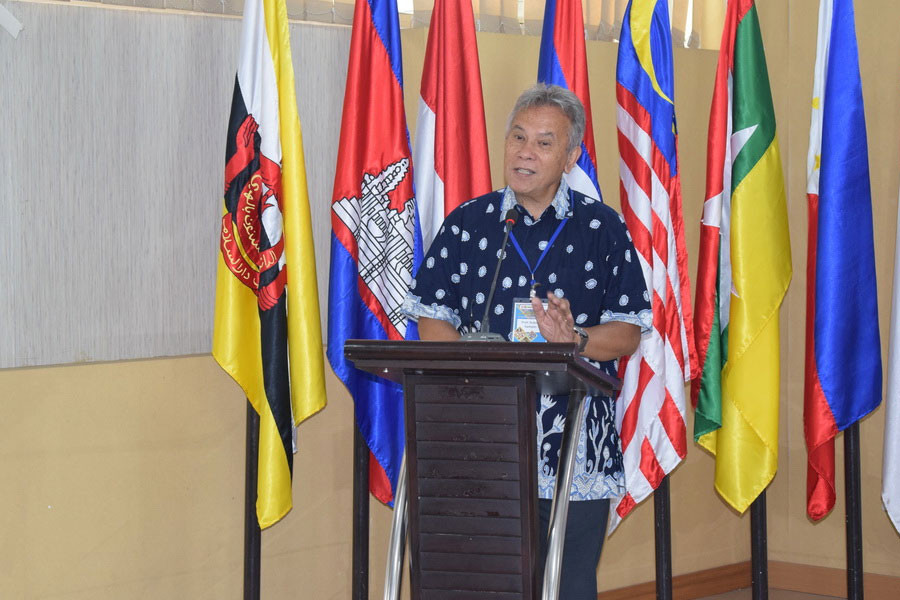SEAMEO BIOTROP featured Prof Robert A. Samson from Westerdijk Fungal Biodiversity Institute, Utrecht, the Netherlands, as a speaker in its third Quarterly Public Seminar 2019. He lectured on ‘Mycotoxin in Fermented Food’ on 5 September 2019 at the Centre’s headquarter in Bogor. The seminar was attended by 52 participants from various research and government institutions, universities, and companies.
Prof Robert began his presentation with an introduction to the mycotoxins, which are toxic compounds produced by many fungi species and have harmful effects when being consumed. Five important mycotoxins include aflatoxins, trichothecenes and other Fusarium toxins, ochratoxins, patulin, and sterigmatocystin. These mycotoxins are also known to be produced by several fungi used in the food fermentation process.
Food fermentation is a process involving microorganisms to convert carbohydrates to alcohol or organic acids under anaerobic conditions, which at the end, a new product will be generated. For examples, Penicillium roqueforti and P. camemberti are fungi which help in producing cheese from milk. Concerning the mycotoxins, Prof Robert said that P. roqueforti can produce mycotoxins in other substrates other than cheese, while P. camemberti can produce cyclopiazonic acid but mostly in low concentration in the rind of the soft cheese.
Another issue related to mycotoxins is the production of rhizonin by Rhizopus microsporus, which is used in tempeh fermentation. The findings cause debate whether it is safe to use the species in the fermentation. Regarding this matter, Prof Robert delivered a study result which showed that the mycotoxin is not produced by the fungi but by the bacterial endosymbiont belonging to the genus Burkholderia which is localised within the fungal cytosol. The fungi with this toxinogenic bacteria were found in a starter culture; thus, the species itself does not produce mycotoxin.
Prof Robert then gave another instance, i.e., Monascus purpureus, which is widely used for the fermentation of rice and known as the red Chinese rice or angkak. The species can produce the mycotoxin citrinin. However, the fermented product is used in Southeast Asia and also becomes popular as a medicine in the Western world because certain metabolites of Monascus have a healing property improving blood circulation by decreasing cholesterol and triglyceride levels.
The last example given was the use of Aspergillus oryzae. It has been known that this species is used for making soy sauce, fermented bean paste, and alcoholic beverages. The species is closely related to A. flavus which produces aflatoxins even though not all strains produce toxins.
With regard to the use of microorganisms for fermentation process, Prof Robert said that there are many fungi and microorganisms that have been domesticated by humans for use in food production, medicine, and research. The domestication concept, including the taxonomical aspect, is significant to determine the right species used in the specific process and to ensure whether the species produce mycotoxins or not.
As a conclusion, Prof Robert conveyed three main points of his seminar: 1) many types of food fermentation exist, but some of them are still poorly studied, 2) starter cultures may produce mycotoxins and it is very important to analyse if the cultures are safe during fermentation, and 3) it is important to evaluate the new taxonomies and the concept of domestication for food fermenting fungi.
Prof Robert is affiliated with the Dutch Species Register as a fungal specialist. He has been working at the Westerdijk Fungal Biodiversity Institute in Utrecht, the Netherlands, since 1970. In 1983 he became the Head of the Department of Services and Applied Research in the same institution, and he formally retired on 01 April 2011. His expertise in food-borne fungi such as Penicillium and Aspergillus leads him to be still active as Emeritus Senior Researcher of Applied and Industrial Mycology research group. He has also been appointed as Adjunct Professor at the Kasetsart University in Bangkok, Thailand, since 2002 and the Portuguese Open University in Lisbon, Portugal, since 2009. To date, he has published more than 400 papers in refereed journals and 110 chapters for books and proceedings. He has also written 44 books in which his first book, together with Garry Cole, is a classical mycological publication describing the conidial ontogeny of Hyphomycetes.
Prof Robert is currently the Secretary-General of the International Union of Microbiological Societies. In addition, he is also an Executive Editor of an international scientific journal, namely Studies in Mycology, and a member of various scientific organisations, including the British Mycological Society, the American Mycological Society, the World Federation of Culture Collections, and the International Union for Microbiological Societies.
Throughout his outstanding career in mycological research, Prof Robert has received many honours, including the recipient of the USFCC/J. Roger Porter Award by the American Society of Microbiology, an honorary membership in the Hungarian Society for Microbiology and the Mycological Society of America, an honorary degree from the Swedish University of Agricultural Sciences, and the de Bary Medal from the International Mycological Association.
 Tuesday, 24 September 2019 on 3:16pm
Tuesday, 24 September 2019 on 3:16pm
